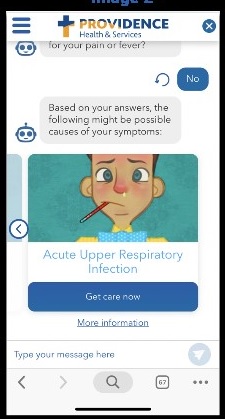 It was Jan. 20, 2020, and BJ Moore, ’91, was one week shy of a notable professional achievement: serving one year as chief information officer at Providence St. Joseph Health, the nation’s third-largest nonprofit healthcare provider. It was Moore’s first role outside of Microsoft since 1992.
It was Jan. 20, 2020, and BJ Moore, ’91, was one week shy of a notable professional achievement: serving one year as chief information officer at Providence St. Joseph Health, the nation’s third-largest nonprofit healthcare provider. It was Moore’s first role outside of Microsoft since 1992.
“The industry was ripe for digital transformation, and I knew I could have a real impact,” Moore said. “There’s nothing more important than the health of our communities.”
However, Jan. 20 was also a day that would eclipse Moore’s upcoming milestone and serve as a turning point in the lives of everyone in the country. Providence received the first COVID-19 patient hospitalized in the United States.
Over the coming months, the importance of telehealth, cloud computing, cybersecurity, and effective management of medical resources, would become increasingly clear to the public.
Providence had a jumpstart addressing these challenges because of Moore and his team’s pre-pandemic efforts to develop their technological infrastructure and improve patient care.
Using technology to better support patients and providers

In July 2019, Moore established a strategic alliance with Microsoft to use its cloud computing and artificial intelligence (AI) technology to complement and enhance healthcare providers’ clinical expertise and care delivery.
The initial transition to Office 365 was supposed to take 10 months, but when the pandemic arrived, Moore’s team kicked their efforts into high gear and migrated 130,000 employees to the new system in eight weeks.
Before COVID, Providence accommodated about 10 telehealth visits each day. Within a month of the first coronavirus case, that number increased to about 10,000 per day.
“Hospital beds went from being concrete to abstract because of virtual health care delivery,” Moore explained. “Thank goodness we had all these strategic initiatives in place before COVID hit. If it had come a year earlier, Providence’s health system would have come to a screeching halt. We didn’t have the systems to work remotely. We didn’t have the cybersecurity to protect us from attacks.”
Beyond larger strategic initiatives to improve Providence’s technology, Moore’s team began implementing new measures to cope with the pandemic. They built a cloud-based health bot that served as a COVID-19 screening tool. The bot triaged patients, routing them to primary care or home quarantine to keep them out of crowded emergency rooms.
Providence openly shared its insights with other healthcare providers and served as the training ground for the transformative AI tool. The health bot became the foundation for the CDC’s coronavirus assessment tool, which has been adopted worldwide to streamline care.
The bot was only the beginning for Providence. Moore’s team transitioned the system to digital recordkeeping as part of the larger initiative to improve operations, so Providence’s AI now had access to the data needed to produce accurate COVID-19 predictions through deep analysis.
The AI was able to identify increased primary healthcare visits where patients complained about body aches and fevers. Then, with 85-90% accuracy, it predicted which communities would see spikes in hospitalizations about two weeks in advance.
Once the AI identified the pattern, it had something to look for, and it gave Moore’s team the data they needed to reallocate resources in preparation for upcoming surges across the seven states in which Providence operates. As new variants arrived, Moore’s team and Providence researchers were able to tune new models and build confidence.
Providence continues to predict changes in hospitalizations and plan for surges, moving nurses, personal protective equipment and ventilators to the communities that need them most. This practice has dynamically increased system capacity that far exceeded expectations.
Blending real estate and IT
In August 2020, Moore’s role expanded to include oversight of the Real Estate Strategy and Operations team (RESO), managing about 50 million square feet of hospital, clinic and administrative space. The combination of RESO with Chief Information Officer, which primarily manages technology operations and patient privacy, was intentional and strategic.
“We went from care delivery at home as a vision to caring for more than twenty thousand COVID patients from home,” Moore explained on the Health System CIO podcast. “(And) we’re not just going to bring people back into their old offices and cubicles. It will now be a collaborative, hybrid work environment … it’s very much a melding of physical spaces and technology to make that workplace of the future.”
The origins of a change-maker
Moore came to Colorado State University as a first-generation student in 1987.
“Being a first-generation college student can put you at a real disadvantage,” he said. “Not having mentorship from your family; not knowing how the process works. Everybody knows you’re supposed to go to college, but really, navigating it is hard.”
Nevertheless, BJ found success in CSU’s College of Business, learning the soft skills he needed to succeed.

“I think what a university teaches you is discipline, the ability to learn and the ability to be flexible,” Moore explained. “CSU is where future leaders and executives are made. We’re the scrappy underdogs – a state school with a lot of heart. It’s all about overcoming adversity, and I think CSU sets you up for that.”
This experience led him to create a College of Business scholarship fund in 2017, supporting students like him: scrappy, first-generation college students just starting to figure things out.
A rocky start to a flourishing career
Moore graduated in 1991 with a bachelor’s in business, focused on finance and marketing, but the timing wasn’t ideal for the 21-year-old graduate. He entered the workforce as the ’90s recession began, finding an accounts payable clerk position at a 300-employee company. Only one year later, the company closed its doors for good, and Moore was one of six employees who made it through rounds of layoffs. He became the sole person in charge of divesting the company.
“Coming out of CSU, graduating with honors, I was ready to take on the world. But that first year out of school was not reflective of what my capabilities were,” he said. “It was hard, but humbling and helped make me who I am.”
A fellow Ram alumni connected Moore with Microsoft shortly after his first position concluded. He moved to Washington in 1992 to work in a finance role. The next 27 years were spent in various positions, from finance to sales, marketing, management, and eventually, vice president. He became a director at 27 and made partner by 30 as the youngest in Microsoft history.
“It was purely meritocracy. It was based upon what I was able to teach myself, the impact I was able to have at Microsoft,” Moore explained. “So, I continued that self-learning – scrappy, you know, the kind of thing that I learned at Colorado State – It was a badge of honor.”
In his time at Microsoft, Moore shepherded two major company transitions. First, from its partner sales structure to commercial volume licensing in the ’90s, and again, when Microsoft stepped into the subscription business in the 2010s.
“Microsoft successfully made the journey, but you know, I remember Bill Gates and Steve Ballmer talking about all these other tech companies that never made a transition as their industry evolved and why they no longer existed, and there was real fear that Microsoft would make that transition and we would become irrelevant,” Moore shared.
Through the years, Moore supported and led the engineering and enterprise commerce departments at Microsoft, eventually becoming the subject matter expert in database technology. He had conversations with Bill Gates about once a year beginning in 1995, but one conversation from Gates’ last weeks at Microsoft stands out.
“It was me educating Bill Gates on databases and networking,” Moore said. “It was surreal. I remember prepping for that meeting feeling like I was going to talk physics with Stephen Hawking – he’s already way out of my league. I have no business updating Stephen Hawking on physics! That’s what it felt like.”
The two disagreed during the conversation. As Moore explained network latency and its impact on database systems, Gates expressed his skepticism with force. He was intimidating, which usually stopped people in their tracks. It didn’t stop Moore.
“But I knew I was right, and I got on the whiteboard and explain it to him,” Moore continued. “And then he got a big smile on his face and said, ‘OK, I learned something today. Thank you.’”
Gates still says hello to Moore when they serendipitously pass on the streets of Seattle.

“I loved my career at Microsoft,” Moore reflects. “In those 27 years, I’d done everything I wanted to do. At 49 years old, I was too young to retire, so you know what? I started asking, ‘Where could I have a big impact?’”
In three years, Moore has made the impact he could only hope for in 2018, changing the way healthcare utilizes technology and saving lives in the process.
Moore didn’t stop when he achieved all he could at Microsoft, he took a leap to try something new at Providence. And now, he doesn’t intend to stop with the capacity-building technological innovation his team has accomplished in the last two years.
In 2020, Moore was instrumental in creating Truveta, an organization founded on the premise that healthcare providers in the U.S. should come together to steward patient data and use it to improve services across the industry as Providence did with its AI predictions. Moore is now the chairman of Truveta’s CIO Advisory Committee.
“Providence was the founding investor of Truveta, and ironically, we hired my former boss from Microsoft to serve as the CEO and founder,” he explained.
Since its establishment, Truveta has added 19 health systems and achieved a $2 billion valuation. It published its first insights in November 2021 on the efficacy of the COVID vaccines, working directly with Pfizer to provide insights.
“So, 19 health systems in the United States own this company. They’re going to be the best stewards of the patient data because they’ve hired the best tech talent,” Moore said. “So, it’s the best of both worlds, right? We’re able to get Microsoft-class engineers but in a company that’s owned by providers who are going to protect the anonymity of patient data. It’s a win-win.”

In 2021, Moore was recognized by the Wall Street Journal as a technology decision-maker for one of the world’s most influential companies. He was also named the 2021 Seattle CIO of the Year by the ORBIE Awards, and most recently announced that he was awarded a patent for blockchain technology.
“My teams have worked on patents before, but this is the first patent I’ve been awarded with my name on it,” Moore said. “I’m very proud.”
About CSU’s College of Business
Business for a Better World
The College of Business at Colorado State University is an AACSB-accredited business school focused on using business to create a better world.
The College provides programs and career support services to more than 2,500 undergraduate and 1,300 graduate students in top-ranked on-campus and online programs. College faculty impart students with the values, knowledge, and skills to navigate rapidly evolving markets and address global challenges with sustainable business models and practices. Our students are known for their creativity and resilience—resulting in a job offer and placement rate of over 90% within 90 days of graduation and readiness to make a difference locally, nationally, and globally.
The College’s highly ranked programs include its Online MBA degree that is among the 10 largest in the nation and its Impact MBA program recently recognized by Corporate Knights as a top 20 worldwide “Better World MBA” program.